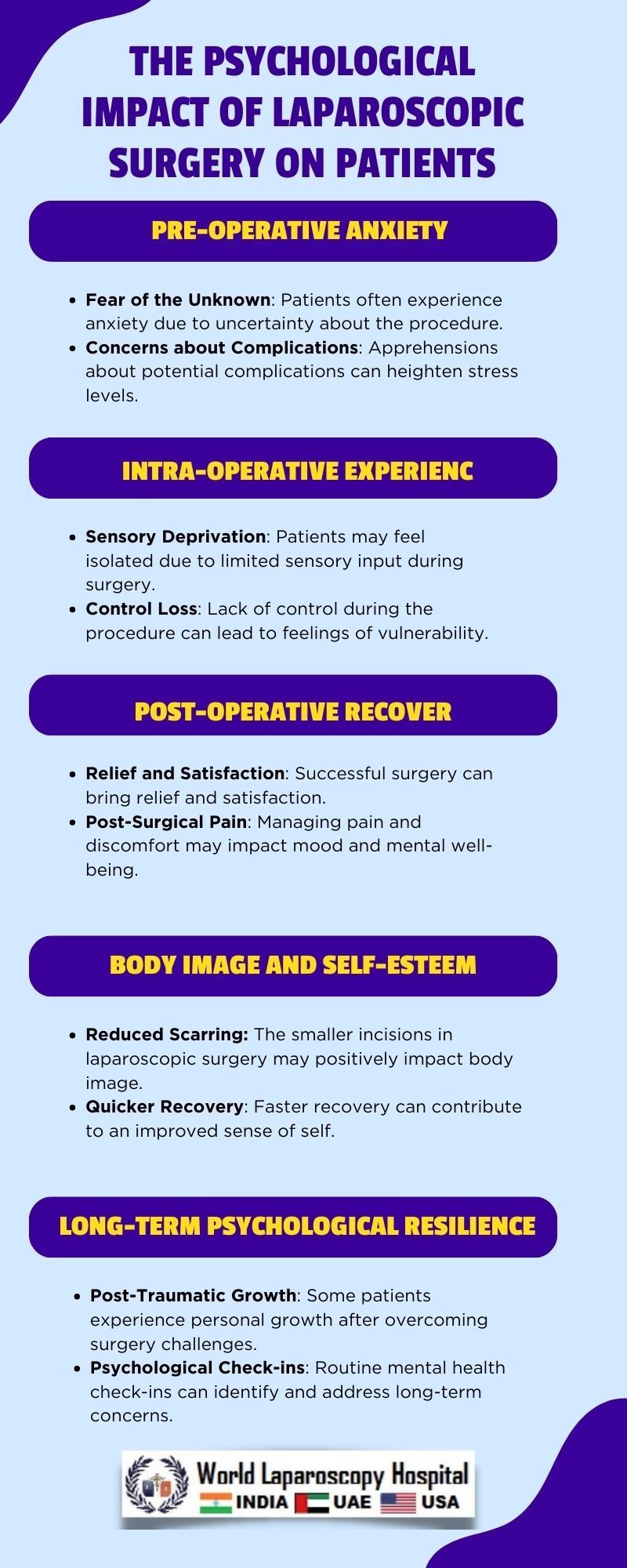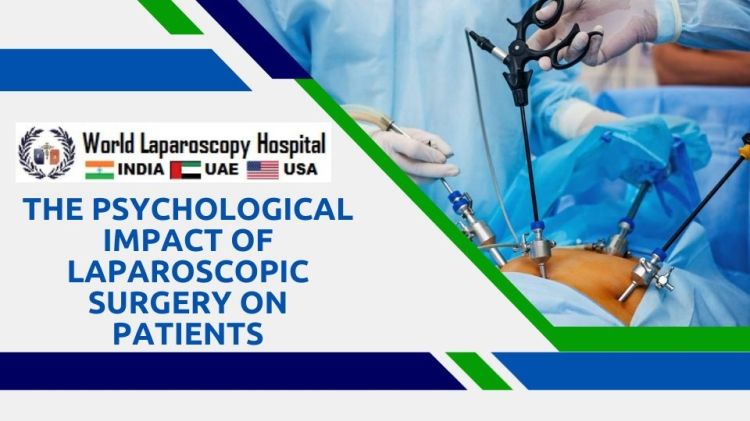The Psychological Impact of Laparoscopic Surgery on Patients
The Psychological Impact of Laparoscopic Surgery on Patients
Introduction
In the realm of modern medicine, laparoscopic surgery has emerged as a revolutionary approach, offering minimally invasive techniques for various procedures. While its benefits in terms of reduced pain, quicker recovery, and smaller incisions are well-documented, the psychological impact on patients undergoing laparoscopic surgery is a subject that deserves closer scrutiny. This article aims to delve into the intricate interplay between the mind and the laparoscope, exploring the psychological dimensions that accompany this innovative surgical approach.

The Evolution of Laparoscopic Surgery
Before delving into the psychological aspects, it's essential to understand the evolution of laparoscopic surgery. Initially introduced in the 1980s, this technique has transformed traditional open surgeries into less invasive procedures. Surgeons use small incisions and specialized instruments, guided by a laparoscope, a thin tube fitted with a camera and light source. This revolutionary shift has redefined the surgical landscape, promising shorter hospital stays, reduced postoperative pain, and faster recovery times.
Anticipation and Anxiety
The journey of a patient begins long before they enter the operating room. Anticipation and anxiety often accompany the lead-up to surgery, and laparoscopic procedures are no exception. Understanding that surgery involves the invasion of one's body can elicit fear and apprehension. Patients may grapple with concerns ranging from the fear of the unknown to worries about potential complications.
The Role of Information
Knowledge is a powerful tool in alleviating anxiety. Providing comprehensive information about the surgical procedure, expected outcomes, and the benefits of laparoscopic surgery can empower patients and help mitigate their fears. Surgeons and healthcare providers play a crucial role in ensuring that patients are well-informed and have realistic expectations, fostering a sense of control over their situation.
The Visual Aspect: Impact of Seeing Inside
One unique aspect of laparoscopic surgery is that patients can witness their own internal structures on screen, thanks to the laparoscope. While this can be fascinating for some, it may induce anxiety in others. The visual aspect of the procedure can be both awe-inspiring and daunting, as patients grapple with the reality of their internal organs being manipulated and observed.
Empowerment through Visualization
On the flip side, the ability to see the surgery unfold on a screen can be empowering for patients. It offers a tangible connection between the procedure and its outcomes, potentially demystifying the surgical process. Some patients find reassurance and a sense of control by visualizing the steps being taken to address their health issues, transforming the surgical experience into a collaborative effort between the patient and the medical team.
Pain Perception and Recovery
Laparoscopic surgery is renowned for its reduced postoperative pain compared to traditional open procedures. The smaller incisions and diminished tissue trauma contribute to a less painful recovery. However, the psychological aspect of pain perception cannot be overlooked. Patients' expectations regarding pain levels, coupled with their preconceived notions about surgery, can influence their overall experience.
Managing Pain Expectations
Effective communication between healthcare providers and patients is paramount in managing pain expectations. Preoperative counseling that addresses the anticipated level of pain, strategies for pain management, and the likelihood of a smoother recovery can significantly impact how patients perceive and cope with postoperative discomfort. Integrating psychological support, such as mindfulness techniques or guided imagery, can further enhance pain management strategies.
Body Image and Self-Esteem
The impact of surgery on body image is a multifaceted aspect of the psychological experience. While the smaller incisions of laparoscopic surgery are aesthetically advantageous, the very nature of surgery can still influence how patients perceive their bodies. Scars, albeit minimal, can become symbolic reminders of the surgical journey, prompting reflections on self-esteem and body image.
Addressing Body Image Concerns
Healthcare providers must recognize and address body image concerns in the context of laparoscopic surgery. Open and honest discussions about scarring, the expected resolution of scars over time, and the overall impact on body image can help patients navigate this aspect of their psychological well-being. Reframing scars as symbols of healing and resilience can contribute to a positive self-image.
Postoperative Depression and Coping Strategies
The postoperative period, often characterized by physical recovery and adaptation to lifestyle changes, can also be a vulnerable time for the patient's mental health. Postoperative depression, while not exclusive to laparoscopic surgery, can manifest due to various factors, including the stress of surgery, changes in routine, and the psychological impact of the illness itself.
Building a Support System
Establishing a robust support system is crucial for patients undergoing laparoscopic surgery. This can involve friends, family, or support groups where individuals can share their experiences and coping strategies. Encouraging open communication with healthcare providers about emotional well-being and providing access to mental health resources can contribute to a smoother transition through the postoperative phase.
Conclusion
In the ever-evolving landscape of surgical techniques, the psychological impact of laparoscopic surgery on patients is a compelling area of exploration. From the initial anticipation and anxiety to the visual aspects of the procedure, the psychological dimensions are intertwined with the physical journey of the patient. Understanding and addressing these aspects are pivotal in ensuring a holistic approach to patient care, where the mind and body are acknowledged as interconnected elements in the process of healing. As laparoscopic surgery continues to shape the future of surgical interventions, so too should our understanding of its profound impact on the psychological well-being of those it seeks to heal.
Top
Introduction
In the realm of modern medicine, laparoscopic surgery has emerged as a revolutionary approach, offering minimally invasive techniques for various procedures. While its benefits in terms of reduced pain, quicker recovery, and smaller incisions are well-documented, the psychological impact on patients undergoing laparoscopic surgery is a subject that deserves closer scrutiny. This article aims to delve into the intricate interplay between the mind and the laparoscope, exploring the psychological dimensions that accompany this innovative surgical approach.

The Evolution of Laparoscopic Surgery
Before delving into the psychological aspects, it's essential to understand the evolution of laparoscopic surgery. Initially introduced in the 1980s, this technique has transformed traditional open surgeries into less invasive procedures. Surgeons use small incisions and specialized instruments, guided by a laparoscope, a thin tube fitted with a camera and light source. This revolutionary shift has redefined the surgical landscape, promising shorter hospital stays, reduced postoperative pain, and faster recovery times.
Anticipation and Anxiety
The journey of a patient begins long before they enter the operating room. Anticipation and anxiety often accompany the lead-up to surgery, and laparoscopic procedures are no exception. Understanding that surgery involves the invasion of one's body can elicit fear and apprehension. Patients may grapple with concerns ranging from the fear of the unknown to worries about potential complications.
The Role of Information
Knowledge is a powerful tool in alleviating anxiety. Providing comprehensive information about the surgical procedure, expected outcomes, and the benefits of laparoscopic surgery can empower patients and help mitigate their fears. Surgeons and healthcare providers play a crucial role in ensuring that patients are well-informed and have realistic expectations, fostering a sense of control over their situation.
The Visual Aspect: Impact of Seeing Inside
One unique aspect of laparoscopic surgery is that patients can witness their own internal structures on screen, thanks to the laparoscope. While this can be fascinating for some, it may induce anxiety in others. The visual aspect of the procedure can be both awe-inspiring and daunting, as patients grapple with the reality of their internal organs being manipulated and observed.
Empowerment through Visualization
On the flip side, the ability to see the surgery unfold on a screen can be empowering for patients. It offers a tangible connection between the procedure and its outcomes, potentially demystifying the surgical process. Some patients find reassurance and a sense of control by visualizing the steps being taken to address their health issues, transforming the surgical experience into a collaborative effort between the patient and the medical team.
Pain Perception and Recovery
Laparoscopic surgery is renowned for its reduced postoperative pain compared to traditional open procedures. The smaller incisions and diminished tissue trauma contribute to a less painful recovery. However, the psychological aspect of pain perception cannot be overlooked. Patients' expectations regarding pain levels, coupled with their preconceived notions about surgery, can influence their overall experience.
Managing Pain Expectations
Effective communication between healthcare providers and patients is paramount in managing pain expectations. Preoperative counseling that addresses the anticipated level of pain, strategies for pain management, and the likelihood of a smoother recovery can significantly impact how patients perceive and cope with postoperative discomfort. Integrating psychological support, such as mindfulness techniques or guided imagery, can further enhance pain management strategies.
Body Image and Self-Esteem
The impact of surgery on body image is a multifaceted aspect of the psychological experience. While the smaller incisions of laparoscopic surgery are aesthetically advantageous, the very nature of surgery can still influence how patients perceive their bodies. Scars, albeit minimal, can become symbolic reminders of the surgical journey, prompting reflections on self-esteem and body image.
Addressing Body Image Concerns
Healthcare providers must recognize and address body image concerns in the context of laparoscopic surgery. Open and honest discussions about scarring, the expected resolution of scars over time, and the overall impact on body image can help patients navigate this aspect of their psychological well-being. Reframing scars as symbols of healing and resilience can contribute to a positive self-image.
Postoperative Depression and Coping Strategies
The postoperative period, often characterized by physical recovery and adaptation to lifestyle changes, can also be a vulnerable time for the patient's mental health. Postoperative depression, while not exclusive to laparoscopic surgery, can manifest due to various factors, including the stress of surgery, changes in routine, and the psychological impact of the illness itself.
Building a Support System
Establishing a robust support system is crucial for patients undergoing laparoscopic surgery. This can involve friends, family, or support groups where individuals can share their experiences and coping strategies. Encouraging open communication with healthcare providers about emotional well-being and providing access to mental health resources can contribute to a smoother transition through the postoperative phase.
Conclusion
In the ever-evolving landscape of surgical techniques, the psychological impact of laparoscopic surgery on patients is a compelling area of exploration. From the initial anticipation and anxiety to the visual aspects of the procedure, the psychological dimensions are intertwined with the physical journey of the patient. Understanding and addressing these aspects are pivotal in ensuring a holistic approach to patient care, where the mind and body are acknowledged as interconnected elements in the process of healing. As laparoscopic surgery continues to shape the future of surgical interventions, so too should our understanding of its profound impact on the psychological well-being of those it seeks to heal.
